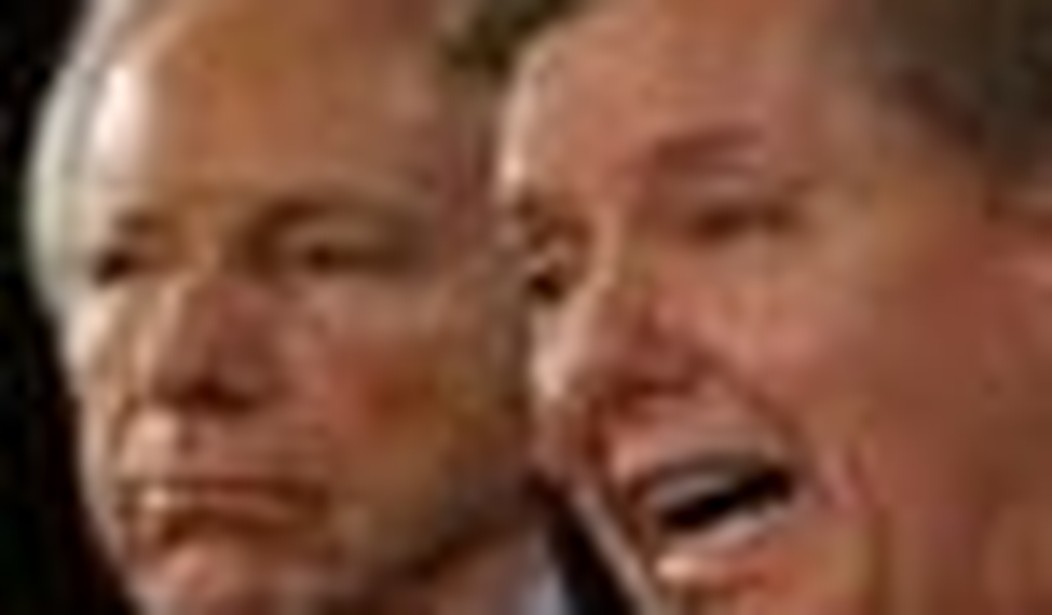President Barack Obama has reached out to Lindsey Graham (R-SC) and Joe Lieberman (I-CT) over controversial photographs of alleged detainee “abuse” in the war on terror, pledging to support congressional legislation blocking their release in a letter to the two senators.
This statement of support, which came at the end of July, is the latest step in Obama’s effort to distance himself from a pledge made early in his still-young presidency. Obama had pledged to comply with a Freedom of Information Act (FOIA) request by the American Civil Liberties Union (ACLU), which sought to obtain, and to publicize, all “documents concerning the treatment of Detainees in United States custody, the death of Detainees in United States custody, and the rendition of Detainees and other individuals to countries known to employ torture” in the war on terror. This request included a call for as few as 21, and as many as 200, photographs showing alleged detainee abuse to be released into the ACLU’s custody.
The initial FOIA request for the photographs, which were discovered as part of a criminal investigation of detainee mistreatment, was filed in 2003; when it was not immediately filled, the ACLU followed the request with a lawsuit. In September 2005, U.S. District Judge Alvin Hellerstein, citing America’s duty to set a democratic example while waging war for democracy, ordered the photographs released. The Bush administration’s appeal of Hellerstein’s decision was rejected by a panel of the Second U.S. Circuit Court of Appeals last September, and its petition to appeal that decision to the entire court was similarly rebuffed.
On April 23 of this year, the Obama administration dispatched a letter to Hellerstein proclaiming that his administration had reached an agreement with the ACLU to release the photographs on May 28.
Barely two weeks before that self-imposed deadline — and barely three after announcing his intention to allow the alleged abuse photos to be released — Obama executed an abrupt about-face on the issue, deciding to resume the previous administration’s legal fight against their publication.
“The most direct consequence of releasing [the photographs], I believe, would be to further inflame anti-American opinion and to put our troops in greater danger,” Obama told reporters at the time of his reversal — a statement that, while stultifyingly obvious, has the benefit of appearing to demonstrate that this president can be taught that his actions as chief executive do have consequences.
The ACLU, which was predictably displeased at this change of heart by the man they perceived to be their president, didn’t have to reach far into its bag of epithets when determining how to respond to Obama’s decision.
“The reversal is another indication of a continuance of the Bush administration policies under the Obama administration,” said Amrit Singh, the attorney who argued the case for the organization. “President Obama’s promise of accountability is meaningless [and] this is inconsistent with his promise of transparency.”
“It’s absolutely essential that these photos be released,” Singh declared.
Whether or not there is in fact a “legal basis for withholding the photographs,” something Jameel Jaffer, director of the ACLU’s National Security Project, vehemently denied in the wake of the Obama reversal, is a matter for the administration and the Supreme Court to sort out in the coming weeks and months (responses to the administration’s petition for certiori are due by September 7).
Far from being “absolutely essential,” though, no tangible benefit to America or any of her citizens can possibly come from publishing years-old photographs of wrongdoing by a tiny number of American servicemen and servicewomen, all of whom have already been investigated and punished for their parts in those actions. The only good that could come from releasing these photographs would be felt by the extreme anti-American left, whose insatiable appetite for “war crime” pornography demands constant feedings of similar material.
The “needs” of the extreme (and perverted) few here in the U.S. and abroad are and should be far outweighed by the fact that, internationally, the release of these images of distant-past, already-punished actions would have provided America’s enemies with yet another powerfully visual tool with which to recruit future jihadists and terrorists to their cause — something we saw in spades after the 2004 release of the Abu Ghraib detainee photos.
“The greatest recruiting tool we had” in the immediate aftermath of the 2003 U.S. invasion of Iraq “was Abu Ghraib,” a former al-Qaeda leader told Senator John McCain in 2007, affirming the case made by soldiers and pundits alike, including Generals Ray Odierno (commander of Multinational Force-Iraq) and David McKiernan (former commander of coalition forces in Afghanistan), that publishing these images would put even more lives at risk both at home and abroad.
In other words, quietly acquiescing to the ACLU’s demand for release of these photos would have been tantamount to publishing and distributing “thousands of al-Qaeda recruitment posters,” as Ben Johnson at FrontPage Magazine put it, all on the taxpayers’ dime and the Obama administration’s watch.
Obama himself acknowledged this fact in a speech given in Strasbourg, Germany, just three weeks before he announced his intent to release the photographs to the ACLU. “When we saw what happened in Abu Ghraib, that wasn’t good for our security,” Obama told the German crowd. “That was a recruitment tool for terrorism.”
Though it took some time — and some prompting from the commanders of our forces who are currently serving on the front lines of the war on terror — Obama finally realized the potentiality that releasing these photographs to the public could have the same effect as the release of the Abu Ghraib images, and decided that he was not willing to risk being responsible for the result.
The U.S. Senate has met Obama’s decision to put the safety of American soldiers and civilians ahead of leftists’ desires by passing legislation — three times — to prevent these and any similar future photographs from being released.
On May 21, the Senate passed the Detainee Photographic Records Protection Act of 2009 (DPRPA) as an amendment to the House’s supplemental appropriations bill. However, this protective amendment, which passed the Senate by unanimous consent, was scrapped in conference. The Senate has since passed DPRPA by unanimous consent twice more, in both amendment and freestanding form. Both are awaiting action in House committees and are unlikely to see the light of day as written in the liberal Democrat-dominated lower house, despite Obama’s declaration of support for such legislation.
Yousef Munayyer, a spokesman for the American-Arab Anti-Discrimination Committee, once claimed that “Abu Ghraib set the bar for obscene inhumanity.” While this is a patently ridiculous statement (Daniel Pearl, Nick Berg, Army Privates Kristian Menchaca and Thomas Tucker, and the thousands of others tortured and slaughtered by radical Islamists were unavailable to comment on Mr. Munayyer’s assertion), there is no doubt the disclosure of images from the infamous coalition prison affected jihadi thought and recruitment in a way mere verbal description never could have.
That Obama recognizes this, and is willing to go to court to prevent a possible repeat of the jihadi recruitment fest the Abu Ghraib scandal became, is something that should be appreciated by all who care about the security of our nation and the safety of our servicemembers and civilians.
However “inconsistent” with Obama’s oft-broken campaign promise of open and transparent government the ACLU may find this decision to be, his decision to withhold these photographs of detainee abuse is the right one — and, where national security is concerned, it is far more important that President Obama be right and effective than that he be consistent.









Join the conversation as a VIP Member